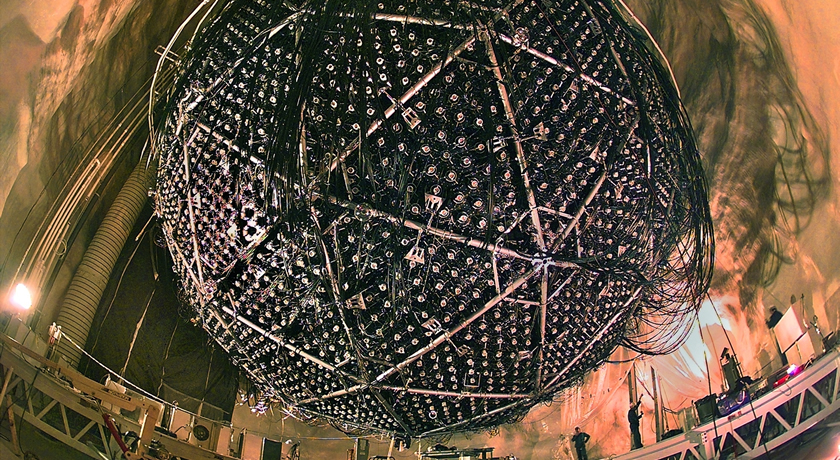
The SNO detector at the Sudbury Neutrino Observatory.
The Prize was presented by the Breakthrough Prize Foundation "for the fundamental discovery of neutrino oscillations, revealing a new frontier beyond, and possibly far beyond, the standard model of particle physics." The $ 3 million prize is shared with four other international experimental collaborations studying neutrino oscillations: The Superkamiokande, Kamland, T2K/K2K and Daya Bay scientific collaborations.
The award was presented at a ceremony at the NASA Ames Research Centre in Moffett Field, California. The ceremony, hosted by comedian Seth MacFarlane, was broadcast live in the U.S. on the National Geographic Channel, with a one-hour version of the broadcast scheduled for Fox on Nov. 29, at 7 p.m.
Professor Arthur McDonald, SNO Project Director, was present to receive the prize on behalf of the collaboration, stated: "Our collaboration members are very pleased to receive this testimony to the scientific significance of their work. Our findings are a result of many years of hard work starting in 1984 when our collaboration began with 16 collaborators, led by co-spokesmen Professor George Ewan of Queen's University and Professor Herb Chen of the University of California, Irvine who were joined in 1985 by Professor David Sinclair of Oxford University. Our international collaboration grew substantially and provided an exciting education for many young scientists over more than 20 years. Our full scientific author list includes over 270 scientists sharing this prize."
The research at the Sudbury Neutrino Observatory, 2 km underground in Vale's Creighton mine near Sudbury, Ontario Canada, demonstrated that neutrinos change their type - or flavour - on their way to Earth from the sun, a discovery that requires neutrinos to have a mass greater than zero. The results also confirmed the theories of energy generation in the sun with great accuracy.
The University of Alberta has been a collaborator on the SNO project since 2007, when Professor and Tier 1 Canada Research Chair in Astroparticle Physics Aksel Hallin moved from Queen's University to establish an astroparticle physics group within the Centre for Particle Physics. Professor Hallin has been a central figure in the SNO project since 1991, and his contributions include leadership in developing the photosensors, electronics, calibration systems and data analysis. The astroparticle physics group established by Professor Hallin now includes Associate Professors Grant and Krauss, and Assistant Professor Claudio Kopper. The group has assumed leadership roles in SNOLAB (of which the University of Alberta is a full member institute). SNOLAB provides a unique environment in which ultra-low background experiments can be performed to look for rare interactions, like those from neutrinos. Current efforts of the University of Alberta group include experiments that are searching for interactions with galactic dark and are involved in the upgrade to the SNO detector, called SNO+.
Darren Grant, an associate professor at the University of Alberta and Tier 2 Canada Research Chair in Astroparticle Physics, is receiving the award based on his work for his PhD thesis, (Carleton University, 2004), on the optical calibration of SNO and an enhanced measurement of the full flux of neutrinos from the sun. Associate Professor Carsten Krauss, director of the University of Alberta Centre for Particle Physics, was a postdoctoral fellow at Queen's University on SNO and did extensive work on the calibration of SNO with neutrons.
Berta Beltran was a postdoctoral fellow on SNO and her work at the University of Alberta included the data extraction to understand the high precision proportional counters that were deployed into SNO during the final years of operation. Her work was used to confirm SNO's earlier neutrino flux measurements. Professor Hallin also supervised two UofA PhD theses on SNO: Chris Howard (2010), who made a measurement of the highest energy neutrinos from the sun, and Shahnoor Habib (2011), who combined all the data from eight years of SNO (operating in all the major configurations) into a single high precision solar neutrino oscillation result.
Founded by Russian entrepreneur, venture capitalist and physicist Yuri Milner, The Breakthrough Prize in Fundamental Physics recognizes individuals who have made profound contributions to human knowledge. It is open to all physicists - theoretical, mathematical and experimental - working on the deepest mysteries of the Universe. The prize is one of three awarded by the Breakthrough Foundation for "Outstanding contributions in Life Sciences, Fundamental Physics, and Mathematics."
The work of the SNO collaboration was also recognized recently by a Nobel Prize awarded to Professor McDonald.